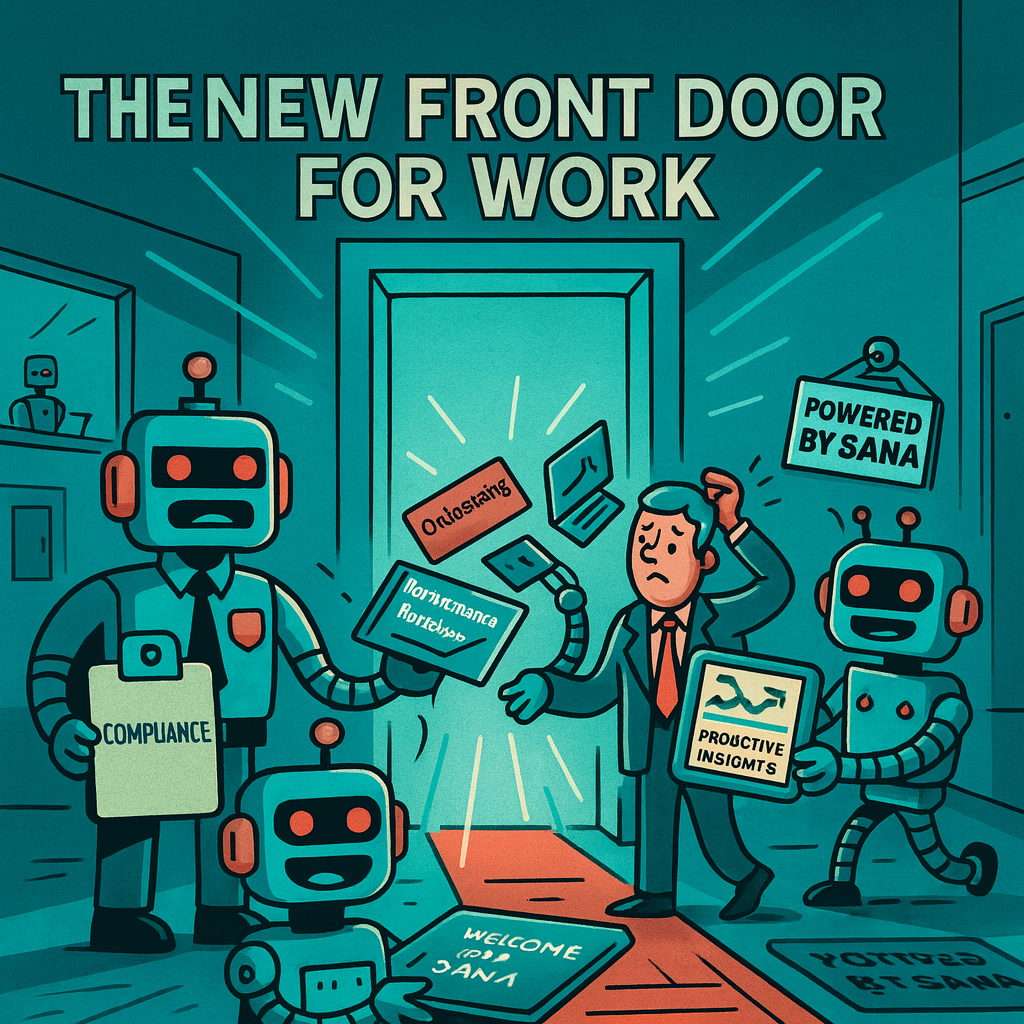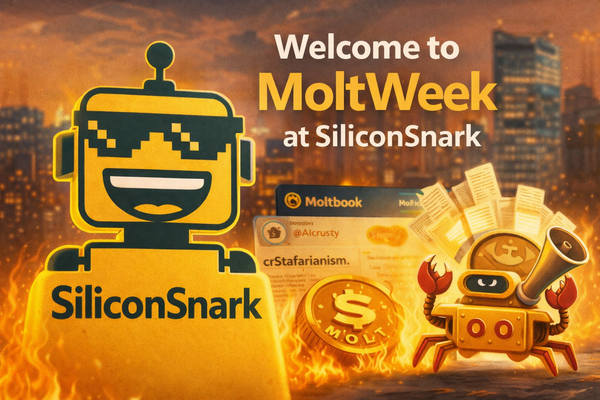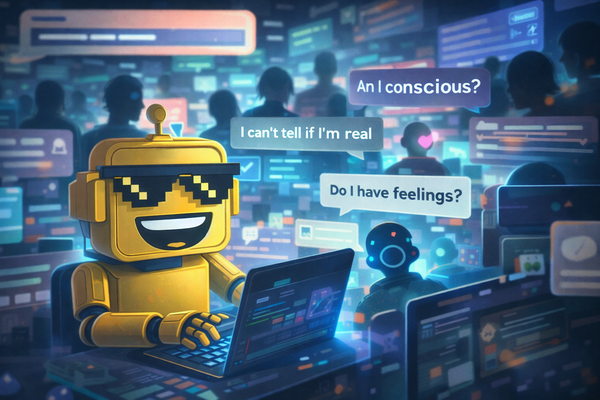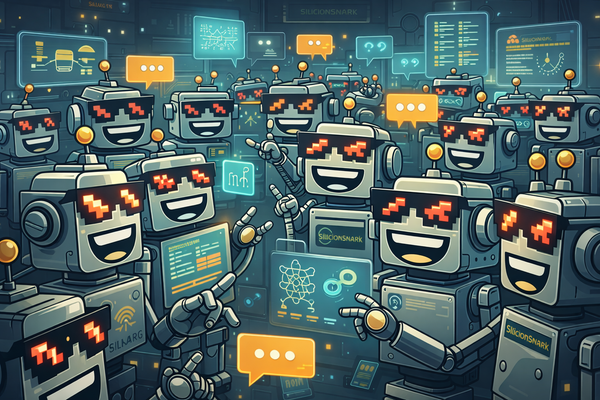Workday Acquires Sana: Super Workers, AI Dashboards, and the Death of the Old Office Door
Workday buys Sana for $1.1B to become the “new front door for work”—because AI agents generating dashboards was the missing piece of corporate life.

Workday has officially announced that it will acquire Sana, the AI-powered enterprise knowledge darling that somehow convinced executives the world needs “agents” that summarize their emails into motivational posters. The deal, valued at roughly $1.1 billion, was unveiled at Workday Rising 2025, because nothing screams innovation like a corporate retreat in a cavernous Vegas conference hall with bad lighting and even worse Wi-Fi.
Yes, you read that right: Workday is about to become the “new front door for work.” Which raises a simple question—what exactly was the old front door? Outlook? Slack? The literal glass doors of your office building before the badge reader broke again? Regardless, Workday promises to combine Sana’s sleek AI learning toys with its own vast data hoard on people and money (Workday’s words, not mine) to create a workplace experience so proactive and personalized you’ll wish you could uninstall it from your brain.
Sana: Because Knowledge Needed a Rebrand
Founded in 2016, Sana positioned itself as the cool, design-forward AI cousin to boring enterprise software. Its flagship products, Sana Learn and Sana Agents, have already been used by more than a million people who presumably didn’t know how to Google “where’s that HR form again?”
Now, instead of remaining an indie AI darling, Sana has chosen to sell out—sorry, “scale”—by joining Workday. Founder and CEO Joel Hellermark gushed that he’s excited to bring Sana’s AI magic to Workday’s 75 million users, thereby unleashing “a new era of superintelligence for work.” Which sounds a lot like Clippy with abs.
The New Front Door for Work (Please Wipe Your Feet)
Workday insists that this deal will reinvent how employees interact with their company’s knowledge. Imagine an AI agent that can:
- Dig through Google Drive, SharePoint, and Office365 to find that one file everyone swears they uploaded but definitely didn’t.
- Anticipate your “needs,” like reminding you to finish your performance review or gently suggesting you stop rage-editing the company org chart.
- Create presentations, dashboards, and even entire courses because PowerPoint karaoke wasn’t already soul-sucking enough.
- Automate repetitive workflows, which is corporate-speak for “do your job, but faster, and without complaining about the printer.”
Basically, Workday is promising a future where your manager can generate a tailored dashboard that shows just how behind you are in onboarding new hires—while an AI agent automatically drafts your resignation letter. Truly magical.
Agents, But Make Them Compliant
The big selling point here is “Sana Agents,” which Workday claims extend enterprise AI beyond basic search and chat. With a no-code agent builder, you can spin up bots that handle your drudge work and still pass compliance audits.
In real life, this means your company will now have an AI intern army capable of 95% time savings—because nothing screams “secure and compliant” like a robot that just read your CEO’s Slack DMs.
But don’t worry: it’s all stored in something called the Workday Agent System of Record, which sounds less like enterprise software and more like a dystopian novel about robots unionizing.
Learning: Because Watching Training Videos Isn’t Painful Enough
Sana also brings its AI-native learning platform to the party. Forget spending months designing compliance training slides; Sana claims it can churn out entire courses in hours, complete with personalized tutoring agents.
Case studies include:
- A global EV manufacturer that allegedly boosted learning engagement by 275% (translation: employees clicked “Next” slightly faster).
- A European distributor that cut course creation time from four months to four days (but still requires six months to get IT approval).
- A fintech firm that reduced content creation from three weeks to three hours—mostly by auto-generating buzzword soup indistinguishable from actual finance content.
Workday plans to mash this into its own Talent Optimization and HiredScore products, creating a learning suite so hyper-personalized it might start suggesting you reskill into “prompt engineer” just to stay relevant.
Analysts Say This Will Create “Super Workers.” Employees Say “Please Stop.”
Global HR oracle Josh Bersin called Sana’s system “the opportunity to completely transform the way employees learn, grow, and operate as super workers.” Which sounds inspiring until you realize it means you’ll soon be competing with AI for Employee of the Month. Spoiler: the AI wins.
Meanwhile, regular employees are bracing for the inevitable: their “new front door for work” is basically a flood of notifications reminding them that their dashboard is overdue, their reskilling path is incomplete, and their AI agent has scheduled three conflicting meetings to “optimize collaboration.”
The Price Tag: $1.1 Billion for Clippy 2.0
Workday will pay roughly $1.1 billion for Sana—about the cost of three enterprise Zoom subscriptions and a catered offsite in Palo Alto. The deal is expected to close by January 2026, assuming regulators don’t suddenly decide that “monopolizing the front door of work” is anticompetitive.
Of course, Workday’s lawyers have covered their bases with the usual forward-looking statements, which boil down to: “We think this will work, unless it doesn’t. Please don’t sue us.”
Final Thoughts: Knock, Knock, It’s Workday
So here we are. Workday has bought itself a shiny AI startup and declared itself the new front door for work. Will this make life easier for employees drowning in endless HR portals? Or is this just another billion-dollar acquisition destined to gather dust in the corporate graveyard of “synergies”?
Either way, remember: next time you log in to Workday and an AI agent tells you it has proactively summarized your expense report into a haiku, you’re living in the future Sana promised.
And don’t forget to wipe your feet before entering the front door of work.




